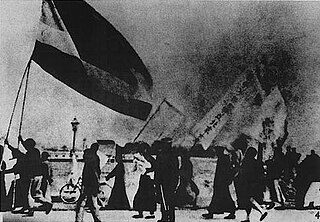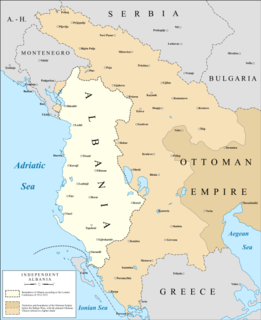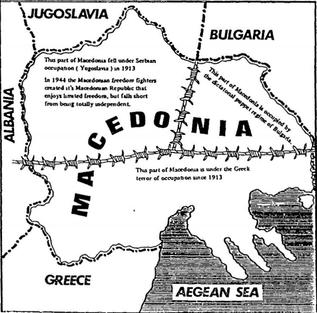Related Research Articles

A nation state is a political unit where the state and nation are congruent. It is a more precise concept than "country", since a country does not need to have a predominant ethnic group.
Nationalism is an idea and movement that holds that the nation should be congruent with the state. As a movement, nationalism tends to promote the interests of a particular nation, especially with the aim of gaining and maintaining the nation's sovereignty (self-governance) over its homeland to create a nation state. Nationalism holds that each nation should govern itself, free from outside interference (self-determination), that a nation is a natural and ideal basis for a polity, and that the nation is the only rightful source of political power. It further aims to build and maintain a single national identity, based on shared social characteristics of culture, ethnicity, geographic location, language, politics, religion, traditions and belief in a shared singular history, and to promote national unity or solidarity. Nationalism, therefore, seeks to preserve and foster a nation's traditional culture. There are various definitions of a "nation", which leads to different types of nationalism. The two main divergent forms are ethnic nationalism and civic nationalism.

In Spain, an autonomous community is the first-level political and administrative division, created in accordance with the Spanish Constitution of 1978, with the aim of guaranteeing limited autonomy of the nationalities and regions that make up Spain.

Chinese nationalism is a form of nationalism in the People's Republic of China and the Republic of China (Taiwan) which asserts that the Chinese people are a nation and promotes the cultural and national unity of all Chinese people, technically it is slightly distinct from Han Chinese nationalism i.e. nationalism of main ethnicity of China, a form of Chinese nationalism applied exclusively to the Han Chinese. In extreme cases of Han Chinese nationalism a sense of jingoism that is felt by purely Han Chinese people who deem themselves superior to ethnic minorities in China and other peoples in the world. According to Sun Yat-sen's philosophy in the Three Principles of the People, Chinese nationalism should be a form of civic nationalism constructed on top of a united value, however this has not been fully recognised or applied in practice by successors.

Han Chinese nationalism is a political ideology and a form of ethnic nationalism which is used to glorify the ethnic Han Chinese people and their uniqueness throughout history, it is often intermingled and mixed with Chinese nationalism. Ethnic Han Chinese people is the dominant ethnic group in China ; the Han Chinese are also a large minority ethnic group in some countries in the world and largest ethnic group in Singapore. Han nationalism is opposed by some like Liang Qichao, but it dominates China.

Basque nationalism is a form of nationalism that asserts that Basques, an ethnic group indigenous to the western Pyrenees, are a nation and promotes the political unity of the Basques, today scattered between Spain and France. Since its inception in the late 19th century, Basque nationalism has included separatist movements.

Greater Albania is an irredentist and nationalist concept that seeks to unify the lands that many Albanians consider to form their national homeland. It is based on claims on the present-day or historical presence of Albanian populations in those areas. In addition to the existing Albania, the term incorporates claims to regions in the neighbouring states, the areas include Kosovo, the Preševo Valley of Serbia, territories in southern Montenegro, northwestern Greece, and a western part of North Macedonia.
Regionalism is a political ideology that seeks to increase the political power, influence, and/or self-determination of the people of one or more subnational regions. It focuses on the "development of a political or social system based on one or more" regions and/or the national, normative or economic interests of a specific region, group of regions or another subnational entity, gaining strength from or aiming to strengthen the "consciousness of and loyalty to a distinct region with a homogeneous population", similarly to nationalism. More specifically, "regionalism refers to three distinct elements: movements demanding territorial autonomy within unitary states; the organization of the central state on a regional basis for the delivery of its policies including regional development policies; political decentralization and regional autonomy".

Spain is a diverse country integrated by contrasting entities with varying economic and social structures, languages, and historical, political and cultural traditions. According to the current Spanish constitution, the Spanish nation is the common and indivisible homeland of all Spaniards, composed of nationalities and regions which the constitution recognizes and guarantees the right of self-government.
European nationalism is a form of nationalism based on a pan-European identity. It is considered minor since the National Party of Europe disintegrated in the 1970s.

United Macedonia, or Greater Macedonia, is an irredentist concept among ethnic Macedonian nationalists that aims to unify the transnational region of Macedonia in Southeastern Europe into a single state that would be dominated by ethnic Macedonians. The proposed capital of such a United Macedonia is the city of Thessaloniki, the capital of Greek Macedonia, which ethnic Macedonians and the Yugoslav leader Josip Broz Tito had planned to incorporate into their own states.

Constitutional patriotism is the idea that people should form a political attachment to the norms and values of a pluralistic liberal democratic constitution rather than to a national culture or cosmopolitan society. It is associated with post-nationalist identity because, while it is seen as a similar concept to nationalism, the attachment is based on the constitution rather than on a national culture. In essence, it is an attempt to re-conceptualize group identity with a focus on the interpretation of citizenship as a loyalty that goes beyond individuals' ethnocultural identification. Theorists believe this to be more defensible than other forms of shared commitment in a diverse modern state with multiple languages and group identities. It is particularly relevant in post-national democratic states in which multiple cultural and ethnic groups coexist. It was influential in the development of the European Union and a key to Europeanism as a basis for multiple countries belonging to a supranational union.

Both the perceived nationhood of Spain, and the perceived distinctions between different parts of its territory derive from historical, geographical, linguistic, economic, political, ethnic and social factors.
Meta-ethnicity is a relatively recent term occasionally used in academic literature or public discourse on ethnic studies. It describes a level of commonality that is wider ("meta-") and more general than ethnicity, but does not necessarily correspond to nation or nationality. In colloquial discourse, it usually signifies a larger in-group of distinct ethnic groups who identify more closely with each other than they would with out-group ethnic groups. The groups within the in-group may be genetically and culturally related which reinforces the grouping.
Irina Livezeanu is a Romanian-American historian. Her research interests include Eastern Europe, Eastern European Jewry, the Holocaust in Eastern Europe, and modern nationalism. Several of her publications deal with the history of Romania, Moldova, and Bessarabia. Since 1996, she is associate professor, Department of History, University of Pittsburgh. In 2010–2013 she served as president of the Society for Romanian Studies.
Left-wing nationalism or leftist nationalism, also known as social nationalism, is a form of nationalism based upon national self-determination, popular sovereignty, national self-interest, and left-wing political positions such as social equality. Left-wing nationalism can also include anti-imperialism and national liberation movements. Left-wing nationalism often stands in contrast to right-wing politics and right-wing nationalism.

The creation of the tradition of the political community of Spaniards as common destiny over other communities has been argued to trace back to the Cortes of Cádiz. Revisiting the history of Spain, after 1812 Spanish liberalism tended to take for granted the national conscience and the Spanish nation.
Among scholars of nationalism, a number of types of nationalism have been presented. Nationalism may manifest itself as part of official state ideology or as a popular non-state movement and may be expressed along civic, ethnic, cultural, language, religious or ideological lines. These self-definitions of the nation are used to classify types of nationalism. However, such categories are not mutually exclusive and many nationalist movements combine some or all of these elements to varying degrees. Nationalist movements can also be classified by other criteria, such as scale and location.
National mysticism or mystical nationalism is a form of nationalism which raises the nation to the status of numen or divinity. Its best known instance is Germanic mysticism, which gave rise to occultism under the Third Reich. The idea of the nation as a divine entity was presented by Johann Gottlieb Fichte. National mysticism is closely related to Romantic nationalism, but goes beyond the expounding of romantic sentiment, to a mystical veneration of the nation as a transcendent truth. It often intersects with ethnic nationalism by pseudohistorical assertions about the origins of a given ethnicity.
Uyghur nationalism is a form of nationalism which asserts that the Uyghur people, an ethnic minority in China, are a distinct nation. Uyghur nationalism promotes the cultural unity of the Uyghur people, either as an independent group or as a regional group within a larger Chinese nation.
References
- ↑ Barriuso Díaz, Santos; Castro Ruano, José Luis (1991). "El nacionalismo, un factor de desarrollo" (PDF). Estudios Regionales No. 30. Archived from the original (PDF) on 3 February 2014. Retrieved 2 March 2012.
- ↑ Hechter, Michael (2000). "Types of Nationalism". The Nationalism Project. Oxford University Press. Retrieved 2 March 2012.
- ↑ Diez Medrano, Juan (August 1994). "Patterns of Development and Nationalism: Basque and Catalan Nationalism before the Spanish Civil War" (PDF). Theory and Society, Vol. 23, No. 4. pp. 541–56. Archived from the original (PDF) on 4 December 2008. Retrieved 29 January 2012.
- ↑ Yuan-Kang Wang (September 2001). "Toward a Synthesis of the Theories of Peripheral Nationalism: A Comparative Study of China's Xinjiang and Guangdon" (PDF). Asian Ethnicity, Volume 2, Number 2. Archived from the original (PDF) on 13 December 2013. Retrieved 3 March 2012.
- 1 2 D.L. Seiler (July 1989). "Peripheral Nationalism Between Pluralism and Monism". International Political Science Review. Retrieved 3 March 2012.